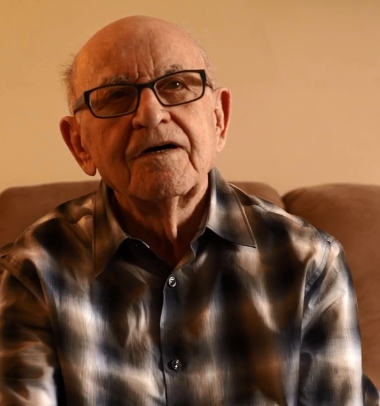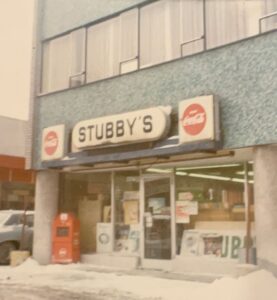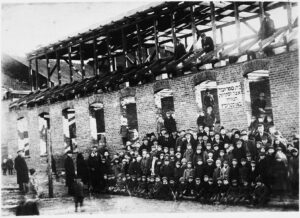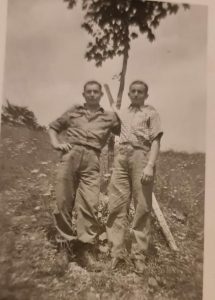
Jack Borenstein
Introduction
Jack Borenstein was born in Ostrowiec, Poland on April 4, 1924, to Szmul Borensztajn (Borenstein) and Alta Leja (Hirszman). His siblings were Perla Rosa (b. 1922), Faiga Tova (b. 1926), and Hershel Hillel (b. 1928).
Jack was named after his grandfather Jankiel Borenstein, who was killed in a pogrom in Ostrowiec in 1904.
As a child he went to a cheyder and later to Polish public school and to Mizrahi/Yavne school
Jack's father Szmul had a soda factory in the basement of the building his father Szmul built in the early 1930's on Gorzysta 13. The building still exists today.
Holocaust Years
During the liquidation of the Ostrowiec Ghetto on Oct 11, 1942, Jack’s family along with about 11,000 other Jews of the town were rounded up at the marketplace (Rynek) and later sent to their death by train to Treblinka. His father managed to get a working permit for him and was told by his father to leave the market and go to the Florian Square where those with working permits gathered. He saw the train taking his parents and siblings to their death to Treblinka.
Jack lived and worked in the steel factory until 1944. During this time, he was beaten and whipped among others by the Ukrainian guards.
In the summer of 1944, the remaining Jews were liquidated from Ostrowiec and sent to Auschwitz for a couple weeks and then sent with a group to Buna where he remained until January 1945. On Jan 18, 1945, the Nazis force marched thousands of Jews to Gliwice/Gleiwitz and later transported to Oranienburg.
He was shuttled back and forth in an open topped cattle car for ten days…from Oranienburg, he was sent to Flossenburg, then to Mildorf, where he was forced to work hard labour. They continued to be from Mildorf and on April 30, 1945, he was liberated in Feldafing Hitler Youth Camp in Germany.
Post War
After spending 5 years after the war in Munich, Germany Jack immigrated to Toronto, Canada on October 20, 1950. He married Nesia Nisenbaum, also an Ostrowiec survivor, in a wedding in Israel on June 1957. After the wedding the couple settled in Toronto, Canada and had 3 sons Sam z"l, Harry and Abe (Avi).
Jack and his friend from Ostrowiec Sam Steinbaum were partners together in Toronto after the war in a variety store and later a famous snack bar/restaurant called Stubbys, where many survivors , including those from Ostrowiec , gathered together to eat and socialize.
After retirement, Jack was active in the Shaarei Tefilla Congregation Synagogue. He continues to live in the Toronto area among his family.

Jack co-managed the smoke shop/restaurant called "Stubby’s" with Sam Steinbaum for many years until Jack retired.
Memories of shopping in Ostrowiec
Jack talking about buying shoes and clothing as a child:
Excerpted from Jack Borenstein's memories of daily life in Ostrowiec:
Shoes & Tailors
There was a son that made shoes…so I always got shoes from him custom made…that was more expensive….it was more expensive…we didn’t go in to a store…even a suit, we had custom made. Material for the suit…. they left a piece to make a hat from the same material. You took the material to a hat make to make a hat. For children, if you needed another suit, (my father) took the old suit and made a suit for myself.
That was life…(how) people lived...nobody lived till a hundred ...like people live here….”
Memories of Daily Life in Ostrowiec as a Youth
An interview with Jack's granddaughter Danya Borenstein
Watch the video about Jack's testimony of October 1942
Jack discusses his memories of the events in October 1942 when the Germans began the major deportation of most of the Jews of the town, including his parents and siblings, to their deaths in Treblinka. Below is a transcript of the video.
“They announced that in the morning… it was right after the Jewish High holidays -a Sunday..that all the Jews should assemble in the marketplace. From there, they called out some people, the ones that were working in certain places for the Germans..should go away out ..I had to go and leave the whole family.. I don’t even remember if I said goodbye to the family… I went to the place that they said..it was really the Police station the place where they assembled the people…because I “worked” – I had really..didn’t work there..but my father paid … I got a paper that I worked: Zaklady Ostrowiecki they called it in Polish..then we marched down.. right to where the Zaklady was, and they prepared ..they put up barracks ..we lived there….
In 1942 …that is when they sent away my family with another 15,000 Jews to Treblinka..we didn’t know anything about Treblinka. We figured they sent them to another city..then the ones that worked there…they lived there in Jewish houses…10 people in a house until they built up barrack and then they moved ….that was 1942…and then a few girls jumped out from the train..and they came back to the camp where we stayed and the told us the story that they found out that the people go to Treblinka…and that’s the the last time that I know that the family is gone, not just my family, but most of the city’s Jews.”
(Photo taken somewhere in 1945 in Ostrowiec- courtesy of Jack Borenstein, second from the left)
See page: "Return of Survivors" for names of those in above photo.










